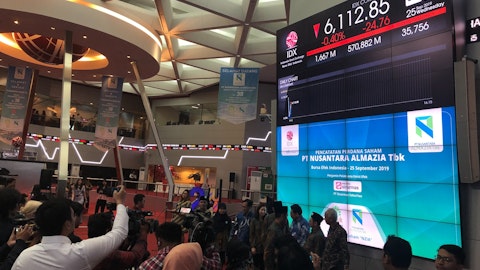We’ve had incredible discussions with our clients to try to get the programs to the right level of profitability. We’ve also been working incredibly hard, not just on rate, but on the claims adjudication process, how we’re acquiring parts, how we’re thinking about repairs and which repair shops to use when the options are available to us to drive more efficiency, and a lot of diligence end-to-end and very much in partnership with the clients. So as we look at the results in the quarter, certainly seeing a similar pattern to what we saw in Q2. But the good news is we’ve seen relative stability. The cost of severity on the auto side is up a little bit in Q3 over Q2, but the premium earning through is also up, and we’re seeing a modest improvement in the underlying loss ratio when we look at the risk clients.
So I feel like we’re doing the right things. It’s going to take time, certainly, to earn through. But early signs of good momentum at least in starting to stabilize as we look to bend the curve. But Richard, certainly anything else you want to add?
Richard Dziadzio: Yes, I think that’s exactly right. And in our prepared remarks, we basically talked about it will take some time. The claims adjudication work we’re doing and the teams are doing a fantastic job, that’s helping us today bend the curve a little bit. We’ve been able to get rate, which is fantastic. But it’s going to take time because we’ve sold what we’ve sold in the past, and that’s going to run through and then the new rates and the new premiums we’re getting, that will come through and help us bend the curve as we go in the future, but it will take some time.
Operator: Your next question comes from the line of Brian Meredith of UBS.
Brian Meredith: Could you talk a little bit about what’s going on in Japan and maybe when we might see a flip there from a growth perspective? I know you said you’ll still see some pressures in 2024, and I know you’ve got the new contracts that are going in. When do we see that flip? I would have thought that was going to be a nice little tailwind for growth in ’24.
Keith Demmings: Yes, sure. We start at the highest level with Japan, I mean — and I’ve talked about this before, and hopefully, this comes through. I mean this is a really, really critical market for Assurant. It’s a tremendous mobile marketplace. It’s the second largest in the world after the U.S. And I do think we are well positioned for long-term growth. That’s the fundamental point. We’re doing a lot of investing in the market, investing in not just capabilities but also talent. And we’re in a really fortunate position today in that we have relationships with every major operator in the marketplace. We don’t do all things for all operators, but we’ve got access, we’ve got deep relationships. And I think over time, that will bear fruit.
I would say, as we think about exiting 2023, we’re certainly stabilizing the financial performance in Japan. We’ve seen some subscriber runoff as we’ve talked about in the past. I expect that to continue to decelerate into ’24. And we do think we’ll grow EBITDA in Japan year-over-year, ’24 over ’23. So I’m really pleased with the hard work that the teams are doing and how we’re positioned in the market. But that market is about what is it going to look like in 5 years? And how do we unlock the full potential of what I think we can achieve in that market.
Brian Meredith: Do you have like a percentage you can give us of how much of the Japanese business is now on a perpetual policy versus, I guess, it was a 4-year policy is what they were?
Keith Demmings: Yes. So the 4-year policies continue to run down. Certainly, the majority of the business is on an evergreen policy. A 100% of the business that is sold today is on an evergreen policy, but certainly, the vast majority.


